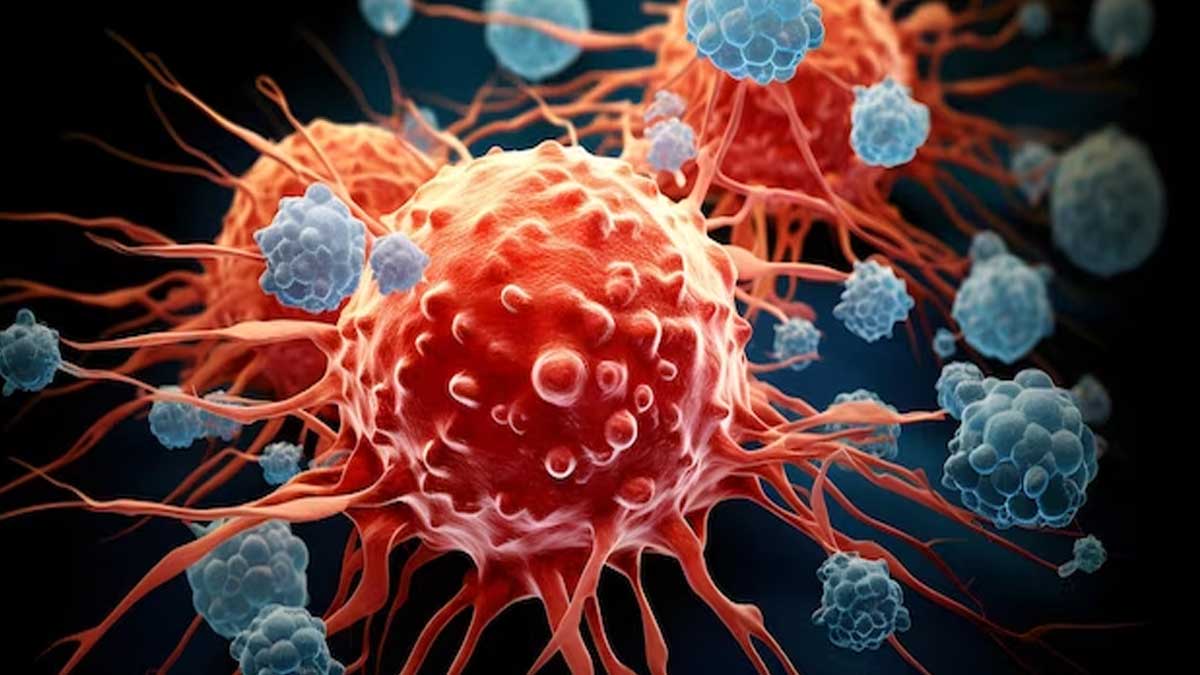
Cancer is one of the leading causes of death worldwide. In men, lung, prostate, colorectal, stomach and liver cancer are the most common types of cancer, whereas breast, colorectal, lung, cervical and thyroid cancer are the most prevalent among women. Currently, there is no definite cure for cancer. However, scientists are continuously working on developing new ways to diagnose and treat the deadly disease. A team of researchers have found a new way to not only detect cancer cells but to kill them. But before we delve into the study findings, here’s what you should know.
How Cancer Cells Differ From Normal Cells

 Cancer cells are different from normal cells in several ways.
Cancer cells are different from normal cells in several ways.
One of the characteristics of cancer cells is uncontrolled and abnormal growth. While normal cells follow a tightly regulated cell cycle, cancer cells often have mutations that allow them to continuously divide and form tumours.
This means, normal cells usually stop dividing when they come into contact with neighbouring cells, also called contact inhibition. Cancer cells on the other hand often lose this ability and continue to divide even when in close proximity to other cells.
Also Read: Pancreatic Cancer: How To Know If The Cancer Has Spread?
What’s even more worrying about cancer cells is that it forms new blood vessels - angiogenesis - that help supply nutrients and oxygen to the growing tumour.
In addition, cancer cells can escape programmed cell death, also known as apoptosis, allowing them to survive and continue to divide even when they have accumulated genetic damage.
Study Findings

Researchers at the Indian Institute of Science (IISc) have made a noteworthy development in detecting as well as killing cancer cells, particularly those that form a solid tumour mass.
The research team has successfully engineered hybrid nanoparticles composed of both gold and copper sulphide materials. These innovative nanoparticles possess a remarkable dual functionality: they have the capability to selectively eliminate cancer cells through the controlled generation of heat while simultaneously facilitating their detection through the propagation of sound waves.
The hybrid nanoparticles showcase a range of distinctive characteristics, including photothermal capabilities, the ability to induce oxidative stress, and the generation of photoacoustic effects, according to Jaya Prakash, assistant professor at the Department of Instrumentation and Applied Physics (IAP), IISc.
He explains, “When light is shined on these hybrid nanoparticles, they absorb the light and generate heat, which can kill cancer cells. These nanoparticles also produce singlet oxygen atoms that are toxic for the cells. We want both these mechanisms to kill the cancer cell.”
“Early detection and treatment are key in the battle against cancer. Copper sulphide nanoparticles have previously received attention for their application in cancer diagnosis, while gold nanoparticles, which can be chemically modified to target cancer cells, have shown anticancer effects. In the current study, the IISc team decided to combine these two into hybrid nanoparticles,” the researchers further shared.
The researchers also highlighted the diagnostic capabilities of the nanoparticles suggesting that they can absorb light and generate ultrasound waves, facilitating the detection of cancer cells with high contrast.
The study findings were published in the Journal ACS Applied Nano Materials.
Also Read: Cancer: The Preventable And Non-Preventable Risk Factors
Understanding The Risk Of Cancer And Ways To Prevent

Here are some common risk factors for cancer:
- Smoking and tobacco products
- Poor dietary choices, high in processed foods and low in fruits and vegetables
- Lack of regular exercise
- Excessive alcohol consumption
- Exposure to ultraviolet (UV) radiation from the sun or tanning beds
- A family history of cancer
- Exposure to carcinogens in the environment, such as asbestos or pollutants
- Certain infections, like HPV and hepatitis
- Age
- Obesity
- Occupational exposure
- Pre-existing medical conditions like ulcerative colitis
Speaking with the OnlyMyHealth team, Dr Ishu Gupta, Consultant - Medical Oncology, Fortis Hospital, Noida, shares certain ways to reduce risk of cancer. These include:
- Staying away from tobacco products
- Cutting off alcohol
- Maintaining a healthy weight
- Minimising occupational exposure to hazardous chemicals and radiation
- Get vaccinated, including HPV vaccine
Bottomline
It's important to understand that not all cancer cells are the same, and the specific characteristics and behaviours of cancer cells can vary depending on the type and stage of cancer. Cancer is a complex group of diseases, and researchers continue to investigate the various factors that contribute to its development and progression. Understanding these differences between cancer cells and normal cells is essential for developing targeted therapies and treatments for cancer.







